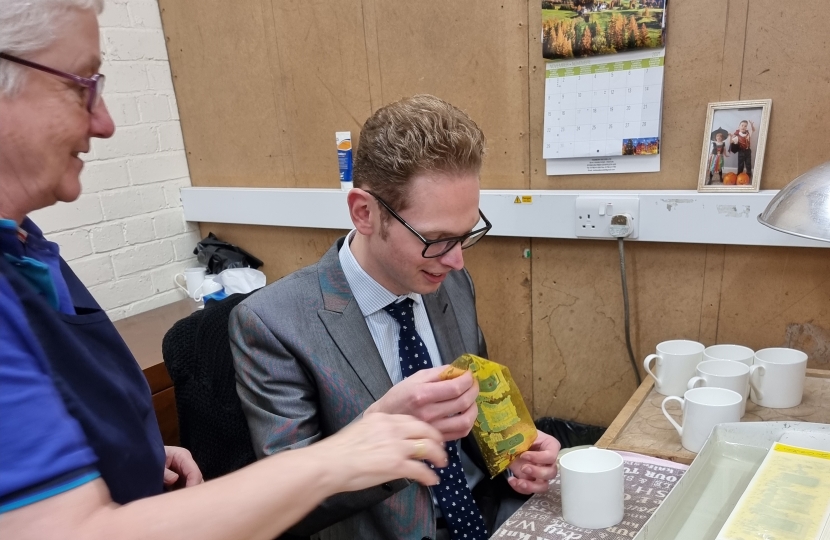
I was pleased to lead a debate in Parliament’s Westminster Hall last week to highlight the real challenges faced by energy intensive industries.
The recent rise in energy prices has caused a headache for most of us, and I stressed that local residents are starting to feel the pinch along with local industry. The huge change in energy prices puts particular pressure on the energy intensive industries – like ceramics in Stoke-on-Trent – which need significant amounts of heat to make the high-quality products we are rightly proud of.
It is vital that we support ceramics and other industries like steel, chemicals and glass, to ensure they become more resilient, with a timely transition to new technologies and secure, sustainable, fuel sources – this is how we will protect skilled jobs in modern manufacturing across North Staffordshire.
According to figures from the Energy Intensive Users’ Group, steel, chemicals, paper, glass, cement & lime, industrial gases and ceramics contribute £38 billion annually to the UK GDP. And the Intensive Users’ Group notes that these industries provide 200,000 jobs directly and support a further 800,000 indirectly. These are not jobs we should lose to overseas competitors with lower environmental standards than our own.
After the success of COP26, we are on the cusp of some huge advances in low-emission energy, we must support industries in making the transition to using more energy efficient and resilient technologies. But we also cannot waste opportunities by taking our eye off the ball of the short-term dangers of price volatility in traditional fuel markets
Here in the Midlands, ceramics is particularly important to our economy. 60% of direct employment in the sector is within the Midlands Engine, and most of this is concentrated in the Staffordshire Potteries, focused on Stoke-on-Trent.
So I made clear to the Minister for Energy the importance of supporting energy intensive industries through both the short-term challenges they face with increased energy costs and investing longer-term in developing the new technologies of the future. We must help release industries such as steel and ceramics from the reliance on unstable global energy markets.
In his reply to my debate, the Minister for Energy, Lee Rowley MP, said:
“I cannot avoid pointing out ceramics, given that that is the genesis of this morning’s debate. Colleagues in Stoke-on-Trent South and beyond have been eloquent champions for the future of the ceramics industry. We are glad to see its continued renaissance and we hope that will continue in the years ahead. It is a great British success story and we want to ensure that that continues.”
Indeed, since 2010, the GVA output of the ceramics sector has doubled in real terms – a turnaround from the decline and closures we saw under Labour in the late 1990s and up to 2010. And it is crucial that we see research and development (R&D) investment in energy intensive sectors, especially ceramics, to keep the success going. For far too long public R&D investment had been focused on the Oxford-Cambridge arc and not much beyond! The Government is committed to doubling UK R&D investment and I have made clear we must see our fair share for world-leading local industries in Stoke-on-Trent.
Energy intensive industries across the United Kingdom will be key to levelling up opportunities, delivering skilled jobs and that pay a good wage.
Whilst the introduction of green energy, like wind and solar, and securing more investment in developing new technologies is beneficial, we must go further, urgently. Electricity prices must be more competitive to help industries with costs and incentivise them to move away from gas.
Electricity is of course not the only solution and certainly not for the largest high-powered kilns and energy users – but hydrogen can be. Recently, I attended JCB’s showcase in Westminster to discuss and look at their incredible cutting-edge work on hydrogen combustion engines, the first in the world.
Hydrogen is clearly a solution that we want to explore further, and I was really pleased to see UK Research and Innovation (UKRI) invest £15 million, which includes Lucideon's work here in Stoke-on-Trent to look at hydrogen powered kilns for firing our ceramic products. Keele University has also been working with Cadent on the safe use of hydrogen in domestic settings.
Whilst these huge investments are welcome, further funds need to be secured to help create the national research facility we want to see for ceramics in Stoke-on-Trent. As I said in Parliament, I will now focus on building on the investment we have already secured and ensure our local manufacturing gets the support needed to continue to grow opportunities for high-skill jobs across our city whilst protecting our environment from the worst emissions.
Originally published in The Sentinel 29/11/21
